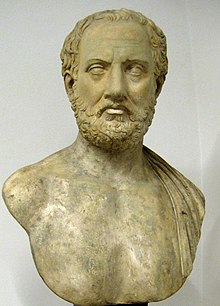
Back Thukydides Afrikaans Thukydides ALS ቶኪዳይደስ Amharic Tucidides AN ثوقيديدس Arabic ثوقيديدس ARZ Tucídides AST Fukidid Azerbaijani Фукидид Bashkir Thucydides BCL
Thucydides | |
|---|---|
Θουκυδίδης | |
 Plaster cast bust of Thucydides in the Pushkin Museum, created from a Roman copy of an early fourth-century BC Greek original located at Holkham Hall | |
| Born | c. 460 BC[1][2] |
| Died | c. 400 BC |
| Occupation(s) | Historian, general |
| Notable work | History of the Peloponnesian War |
| Relatives | Oloros (father) |
Thucydides (/θjuːˈsɪdɪˌdiːz/ thew-SID-ih-deez; Ancient Greek: Θουκυδίδης, romanized: Thoukudídēs [tʰuːkydǐdɛːs]; c. 460 – c. 400 BC) was an Athenian historian and general. His History of the Peloponnesian War recounts the fifth-century BC war between Sparta and Athens until the year 411 BC. Thucydides has been dubbed the father of "scientific history" by those who accept his claims to have applied strict standards of impartiality and evidence-gathering and analysis of cause and effect, without reference to intervention by the gods, as outlined in his introduction to his work.[3][4][5]
Thucydides has been called the father of the school of political realism, which views the political behavior of individuals and the subsequent outcomes of relations between states as ultimately mediated by, and constructed upon, fear and self-interest.[6] His text is still studied at universities and military colleges worldwide.[7] The Melian dialogue is regarded as a seminal text of international relations theory, while his version of Pericles's Funeral Oration is widely studied by political theorists, historians, and students of the classics. More generally, Thucydides developed an understanding of human nature to explain behavior in such crises as plagues, massacres, and wars.[8]
- ^ Virginia J. Hunter,Past and Process in Herodotus and Thucydides, (Princeton University Press, 2017), 4.
- ^ Luciano Canfora, 'Biographical Obscurities and Problems of Composition', in Antonis Tsakmakis, Antonios Rengakos (eds.), Brill's Companion to Thucydides, Brill, 2006 ISBN 978-9-047-40484-2, pp. 3–31.
- ^ Cochrane, Charles Norris (1929). Thucydides and the Science of History. Oxford University Press. p. 179.
- ^ Meyer, p. 67; de Sainte Croix.
- ^ Korab-Karpowicz, W. Julian (26 July 2010). "Political Realism in International Relations". In Edward N. Zalta (ed.). The Stanford Encyclopedia of Philosophy (Summer 2013 ed.). Retrieved 23 March 2016.
- ^ Strauss, p. 139.
- ^ Harloe, Katherine, Morley, Neville, eds., Thucydides and the Modern World: Reception, Reinterpretation, and Influence from the Renaissance to the Present. Cambridge, Cambridge University Press (2012). p. 12
- ^ "What Thucydides Teaches Us About War, Politics, and the Human Condition". War on the Rocks. 9 August 2017. Retrieved 30 July 2023.